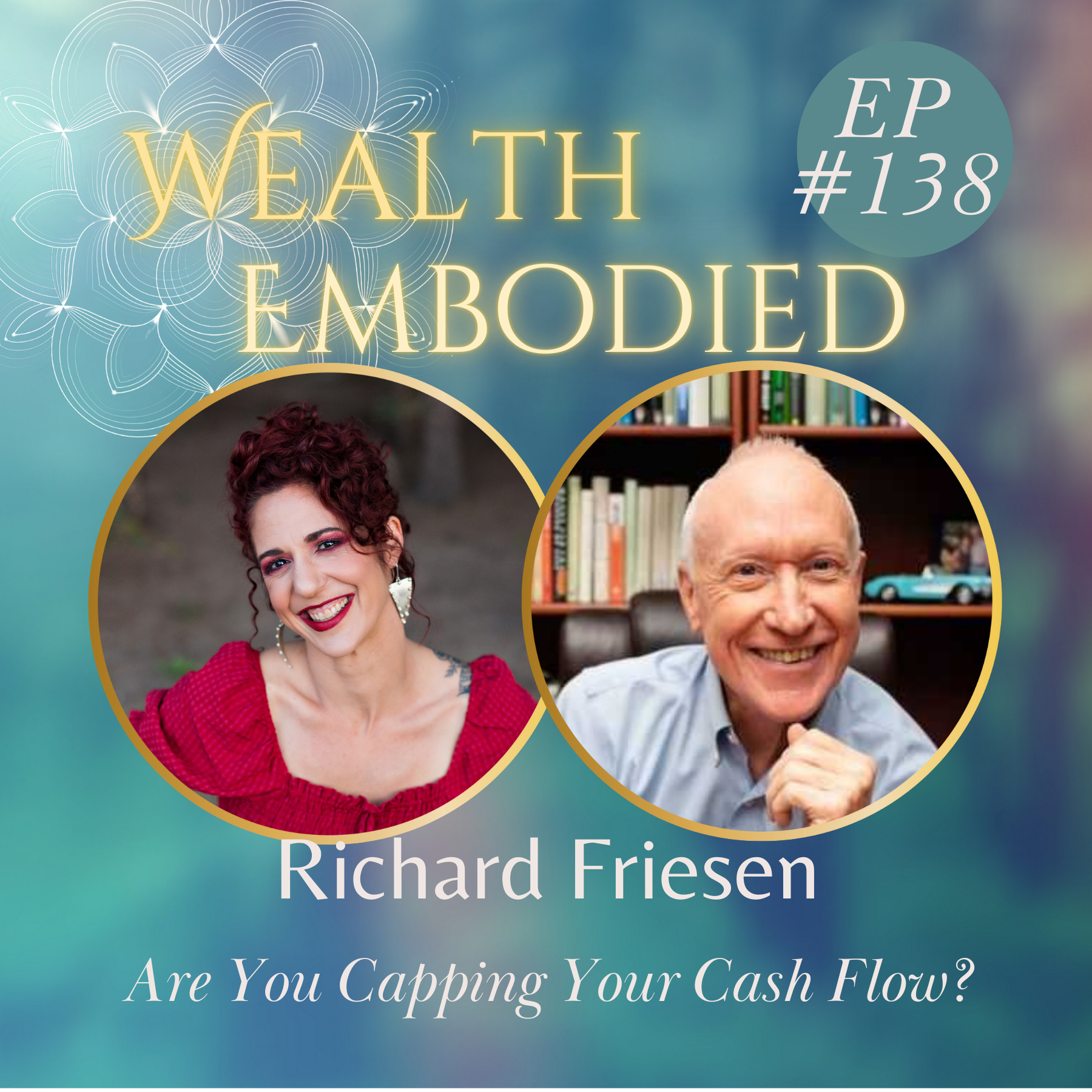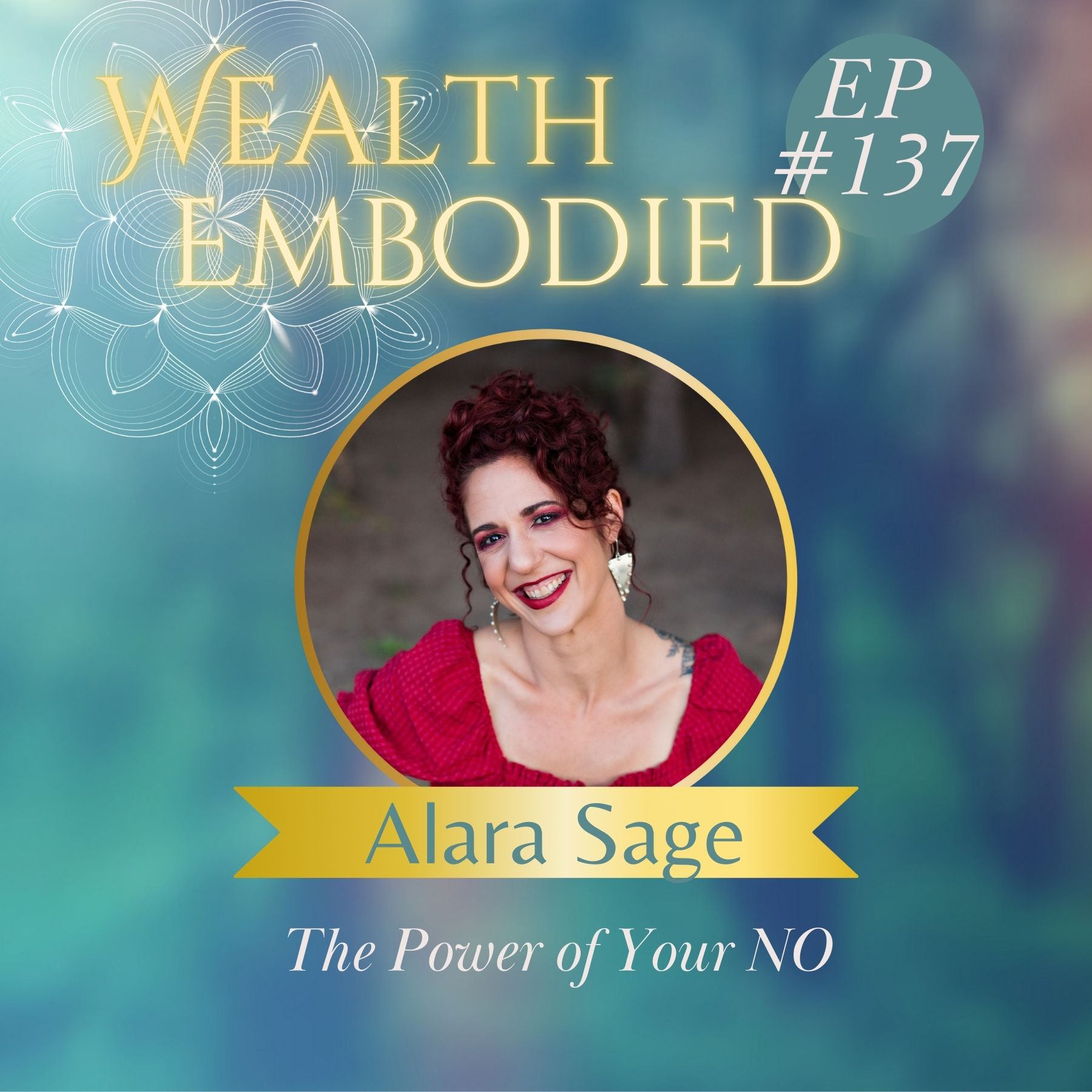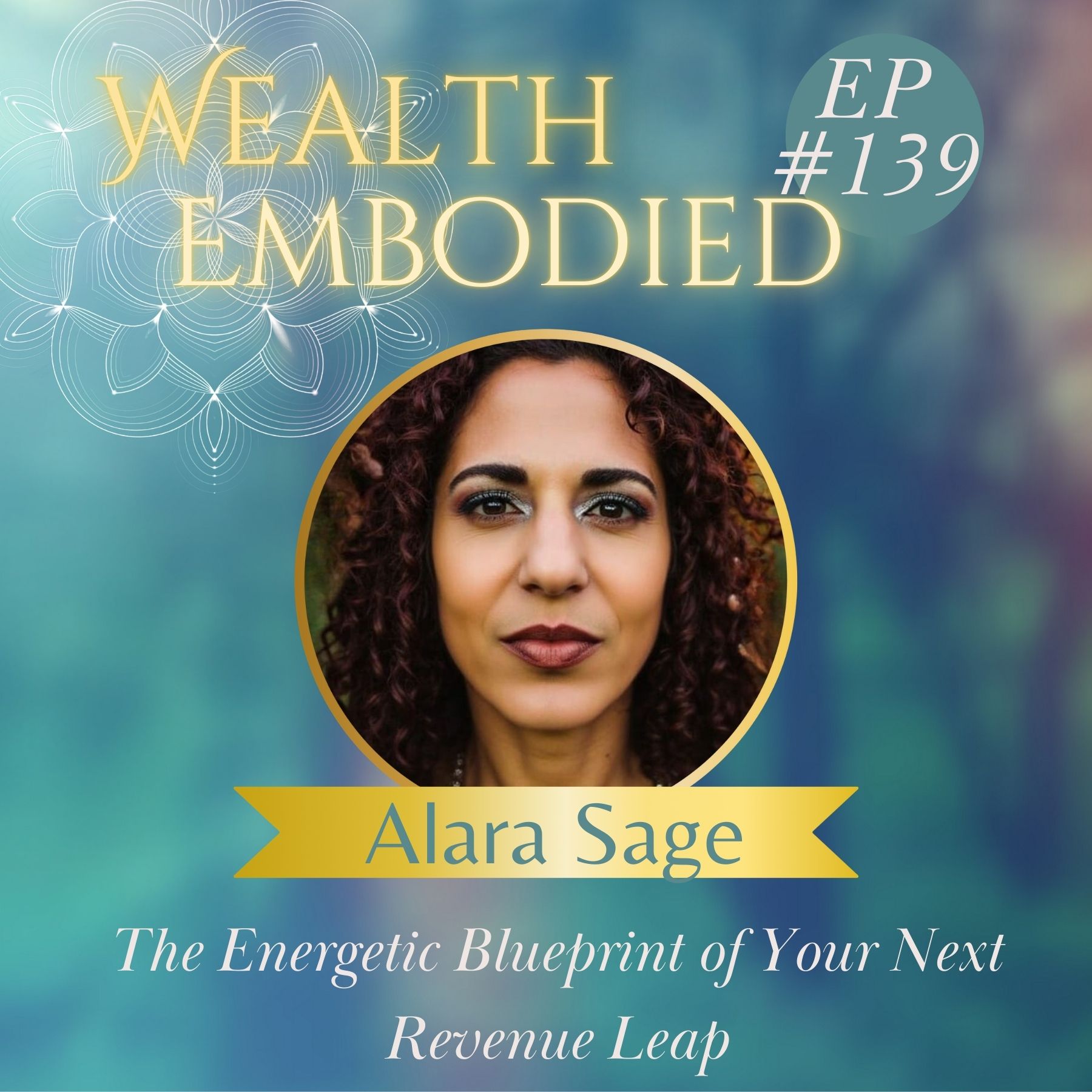Episode Transcript
Alara Sage (00:01.602)
Hello, hello, and welcome to Wealth Embodied, where we activate and inspire you in your wealth consciousness, your creative genius, and your visionary impact. I'm your host, Alara Sage. And have you ever thought, have you ever considered that maybe internally in your mind, in your subconscious, you have placed a cap on your success, a limit, a glass ceiling, per chance?
We're gonna talk about this today with our wonderful guest, Richard Friesen, who works with professionals and business leaders to boost their effectiveness with joy and grace. His neuroscience-based mind muscle model empowers clients to reach their goals through online training, simulations, interactive exercise, group support, and real-time.
decision process. love that so much. Richard, welcome, welcome.
Richard Friesen (01:00.056)
Well, thanks. It's so great to be here. And I've listened to a couple of your podcasts and my gosh, you are getting down to some of the core fundamentals when most people are dealing with symptomatic things up here. So I'm looking forward to just a wonderful, creative conversation.
Alara Sage (01:16.504)
I love that. love to go deep. So yes, that's my space. So Richard, tell us you have this wonderful story about your own personal cap at 200,000. Can you tell us about that?
Richard Friesen (01:28.942)
Sure. It was April of 1995. The middle of the night, I heard a voice and I sat up in bed and the voice said, Rich, you're only worth 200,000. I looked around. I mean, I heard that voice just as clearly as I hear yours now. My wife was sleeping peacefully beside me. There was nobody else in the room.
And it occurred to me where that came from was something deep and inside of me. And I realized at that point that this was a decision in my life. I got up, showered, dressed, and I drove across the Golden Gate Bridge to the Pacific Stock Exchange, where I was a market maker. And I sat on the stone steps there in between the pillars. And I thought about that voice. So let me give you a bit of background. I worked for a large
arbitrage firm, hundreds of millions of dollars of capital, PhD quants giving me valuations. And what we did is we traded options, futures and stocks. But now I was on my own. And the first year I made very carefully $125,000. Because I didn't have as much capital than 150, 175, 200, 200, 200.
And that was when I was woken up with that voice in the middle of the night that said, Rich, you're only worth 200,000. So I got there so early, the doors were still locked. When they finally opened, I was the first guy in the trading pit. Now, trading pits are gone, it's all electronic. But at that time, you didn't own a spot in the pit. It was just determined by whoever, the best spots by the most toughest, the...
the guys who had the most capital or the guys who are most aggressive. Sometimes the guys who are the most minimist. But I went and I stood in the best spot in between the two most busiest brokers and right in front of the bookstaff so I could get orders from all three places. So eventually the other market makers and traders drifted in and the guy who always stood there looked at me, looked at the clock.
Richard Friesen (03:53.39)
and tapped me on the shoulder. I didn't move. I pretended I had concrete boots on. The bell went off and he went pushing and I went pushing and the staff ordered it said that if you know if you guys get in a fight a $10,000 fine for both of you. So they started calling out orders and I went buy 50, sell 100, buy a 20. I was the most aggressive guy there and the rest of the pit thought that rich freezing.
Alara Sage (04:11.757)
Wow.
Richard Friesen (04:23.17)
had gone berserk.
Well, I went on to make many times that year. But what was interesting was that voice in the middle of the night, my limitation was all here. And I will grant you that it was physiologically locked into my body also. But that voice broke it. So I started building a trading firm with that money I made. And some of the traders did very well with my system.
Some of them did okay, but about a third of them just couldn't do it. And it occurred to me, what if they had their own internal identity, beliefs, behavior systems locked into their physiology, locked into their head that prevented it? So I brought in a hypnotherapist and sure enough, they all had stories, beliefs, and a core identity. For example, one of the identity was, I'm not worthy.
Another one came from a culture that said wealthy people are bad. Another one was respect for his father who worked so hard for money that if he made it easily, it was disrespect. And so I realized how much of our success is that deepest level, all going down from not only just our knowledge, our skills, our behaviors, our beliefs, our identity, but maybe even
further down to some sort of spiritual core.
Alara Sage (05:59.532)
That is a beautiful story. love that. And so were you able to help those that were in the middle? Were you able to help them shift out of that?
Richard Friesen (06:09.08)
Well, that's exactly right. And that's what we did is with the hypnotherapists. Once they realized what that underlying story was, they were able to make the shift or they were so locked into it, they were unable to do it. But at least we knew where the problem was. And that now I've translated is how can I make that voice in the middle of the night intentional? And that's exactly right. How can...
It was an accident for me that, you know, everything was bubbling up and just ready. But what about those people who are unaware of those subconscious conflicts? How can we? Is there an intentional process? And that's what my book, A Private Conversation with Money is about, to bring that subconscious conflicts into awareness so that we can make better choices for myself. And that's what I do. I work with my clients, the clients who come to me.
There's all sorts of financial advice. There's all sorts of symptomatic relief. But we look and we go down to where is the deepest level of the problem so that we can actually make a shift and eliminate the internal conflicts.
Alara Sage (07:23.658)
It's honestly why I love playing with money because I think, I believe that money is this wonderful opportunity. It gives us a measurable asset, right? That we can actually see the measuring. can see how it fluctuates up and down very clearly and also reflects to us, right? Those belief structures that we have around worth, our belief structures around what we believe is possible for ourselves. I think a lot of times people just say, well,
Richard Friesen (07:41.559)
Yes.
Richard Friesen (07:51.405)
Mm-hmm.
Alara Sage (07:52.952)
This is the career that I have, right? If somebody isn't a business owner or they're not an investor or trader, they're in a career and they think, well, this is the business, you know, this is the career I'm in and it's capped at this, but that's not true either. It doesn't matter whether you're an entrepreneur or a trader or you have a career and you're paid a salary. You know, there is always opportunity to expand our wealth. And this is always to me, the first step. So I love what you're doing because it is getting down to that
And isn't it pretty phenomenal and very interesting the beliefs that we have in our head, like the one that you said about the man about his father, right? That's not even like a collective conscious belief, right? That's a very unique belief to him. And it's one of those beliefs that's in there. You put it in there when you were a child, you carry forward, you don't even realize that that belief is existing and continues to cap you out.
Richard Friesen (08:39.619)
Mm-hmm.
Alara Sage (08:51.053)
or make creating money, you know, struggle or you have to work hard for it. Are there any other fun ones that you've really experienced with your clients? Any other fun beliefs that you've come across?
Richard Friesen (08:57.198)
Yep.
yes, indeed. So, and especially in our current culture, because we have a lot of pressure that around fairness, equality of outcome, wealth is bad, wealthy people are greedy, that we need more controls and constraints. our current, especially as the current political divide, there's a...
The people who come to me, my clients, have a really good heart. They want the best for everybody. But for them, to make money, it's like they've adopted the one pie model that if I actually do more, if I become wealthy, somebody else gets less. So my translation for money is that money is a certificate of appreciation. So Laura, if you do a service for me,
Alara Sage (09:56.248)
Hmm.
Richard Friesen (09:59.884)
I go, wow, you've made my life better. Here is a certificate of appreciation.
If the reverse is true, I do a service for you, you say, Rich, wow, you made my life better, more interesting, more entertaining or whatever. Here is a certificate of appreciation. Now, are you ready to have your head blown open? The more certificates of appreciation you collect from others, the more value you have delivered.
Alara Sage (10:28.137)
Yes, please do.
Richard Friesen (10:39.288)
to the world. So rather than seeing money as taking something out of the system or I have more and you have less, the more value we've delivered, the more certificates we collect, we can go, yes, look at the value I have delivered to the world. This reframe is so powerful that clients who have good hearts, who want the best for every, all of a sudden they can go,
No more internal conflict, but I can now deliver value.
Alara Sage (11:12.76)
I love that so much because it goes along with what I say about it being a measurable asset, right? So you can really look at your monthly P &L, the bottom line that you're having every month, right? And be like, that is how much value I delivered. And what do I want to, how much more value do I want to bring? That's such a beautiful reframe because I think the vast majority of people want to give, we want to bring our services into the world, our genius, we want to support and help others.
You know, it's very few actually, the ones that are truly greedy, the ones that are the crabs in the bucket, you know, that are just climbing on the backs of everybody else. Most people, you know, truly do come from the heart. I love that reframe so much. One of the things that you mentioned, and this kind of goes on the back of what we just spoke about, is you say that there's no such thing as self-sabotage. So, Rich, if we have these belief structures, right, that are
Richard Friesen (11:46.062)
Yeah.
Alara Sage (12:07.692)
holding us back or putting a glass ceiling on us. How is that different than self-sabotage?
Richard Friesen (12:14.488)
Well, again, we do a free reframe here. So I work with my clients. say, what behaviors no longer serve you. And then I say, we list them out and we'll take one of them and say, okay, what is the positive intent of this behavior? What? The positive intent? It's not working. What is the positive? And this might take a half an hour, an hour to work down, but we get the positive intent of those. For example, if I work with an investment manager,
and he starts making some money and then he gets cocky and blows it and all of a sudden his equity is going down. I say, okay, what is the positive intent of that behavior? so I can feel I'm a master of the universe and I've always felt like I've never really made it and all of a sudden here I am, I've made it, I'm a master of the universe.
and it feels so good that I can do anything. Okay, so the positive intent is you want to feel value, that somehow being a master of the universe gives you worthiness and supports that identity. Yes, okay, so how's it working for you? not so well. So what we can do is we can take the positive intent of that behavior and say, okay,
How would you like to do it better? And how would you like to make that internal identity of worthiness and bring it to some core rather than trying to externally create that value for yourself? Now, once we have the positive intent, now how do we create behaviors from that positive intent? So we look at behaviors that no longer serve as self-sabotage.
but as a message to us to say, we're trying to do something up here. What is the positive intent and how can we do that better?
Alara Sage (14:19.37)
Yeah. So again, like a flip around and really taking that positive intent and bringing it consciously, right? Consciously into your reality rather than it just kind of happening in the background. You may or may not be conscious of it. I love these reframes. They're very, powerful. Do you find with your clients that they're able to bring these reframes and create patterns and behaviors?
because that's what it's all about, right? Fairly easy for themselves or do you find sometimes they're slipping up a little bit and repeating that same attachment to the identity?
Richard Friesen (14:57.262)
Ha
my gosh, yes, because our safety, our patterns are so embedded. one of the things I heard in previous podcast that you gave is how they're embedded physiologically. Man, culturally and in our communities and in our family from all the messages from our background. So to step into a new world means that you are leaving
Alara Sage (15:16.116)
Yeah
Richard Friesen (15:29.28)
a lot of the old world behind and physiological habits, the neurological neural connections. So what this does is this takes
a reframe on a core identity level. Short story, a client came to me and he had for seven years been building an HVAC business, heating, venting, wetting, air conditioning. And he knew exactly his goal was to sell it to a large national company. So he built this local company. He knew all the criteria that they wanted to buy a smaller company.
And he built it with that in mind, worked 12 hours a day, seven days a week. finally, he was in negotiations with this company and he was starting to nitpick it. He was starting to put sand in the gears. And that's when he came to me. And what it turned out was when we did our work was what is the positive effect? What is the positive behavior that that is?
trying to accomplish. And he realized, one, if he sold the company, who was he? If he sold the company, he was wealthy and his family, his culture, his background was anti-wealth. He was politically liberal. And all of a sudden to have this much money put him in the other side of the political continuum. So once we looked at these positive intents and said,
and handled him, that he could in fact live with a family, he could have still keep those relationships, that his good heart could still be maintained even with wealth. Then all of a sudden we refrained that.
Richard Friesen (17:23.606)
And now he could step into it, complete the negotiations, and start a new life with millions of dollars in his bank account where he could start to do something where his heart was.
Alara Sage (17:37.25)
So beautiful because money is an amplifier, right? So we get to use it to amplify our purpose, to amplify our mission. And again, for those of us, the majority of us who are heart centered, that's what money is here to do. It's here to help us, support us to create a larger impact. I love, that you came from trading. I just have to ask you this. Was it just totally out of the box what you did with the hypnosis?
Richard Friesen (17:42.958)
Mmm.
Alara Sage (18:07.05)
in trading and was there any kickback to bringing that in at that era, that time?
Richard Friesen (18:15.768)
Well, the wonderful thing about trading is it gives you immediate feedback on your behavior. And so as a result, the traders in my my company were very interested because they knew that if they didn't perform, you know, they wouldn't continue. So there was a strong motivation there. The the challenge with my current coaching practice
Alara Sage (18:21.343)
Yes.
Richard Friesen (18:46.034)
is that trading requires a strong, tough ego. And to bring it say, OK.
I need to be more aware. I need to look at my physiological state, my emotional state, my quality of my thinking process. It's difficult for people who are pushing that hard in that direction. I was able to bring my psychological training, my master's degree, my therapy training into the financial world. And that has
been a real boon to be able to meld those together. But it's also a challenge for people who are really driven because they have built such a physiological shell that moving to step to say, what we did when we started, you know, we took a breath being fully present. Like if I look at myself right now and I'll say, I'm really
geared up, I got adrenaline flowing talking to you, I'm so excited about this. What if I were just to take a breath and just be here, be here with Alara? this feels better. Which brings us to how we make that change is in the moment, how do we set it up so it feels better?
Our survival mechanism does not permit us to step into something that feels worse in the moment. So how do we set it up so it feels better? So just taking that breath right now, I'm this feels better.
Alara Sage (20:39.064)
I really love how you spoke about ego. And it's such an important point for the audience to understand. In a lot of times, in a lot of understandings, we need strong ego because ego really creates that ambition. It creates that sense of identity. It creates that will to move through the challenges. Strong ego is important in a lot of ways.
to be successful and then simultaneously we have to be flexible. We have to be willing to let go of that ego, right? And re-identify and re-identify and bring that strength into the new identity, but keep re-identifying, keep re-identifying, keep dissolving that ego into more of our innate truth and intelligence. But it's so important point because
When you were talking just then about the traders, I could really feel that strong sense of ego and that shell that you were speaking about, which really limits their ability to have that self-awareness, right? Because it is rooted in the body, the limiting beliefs, the chemical reactions that happen in our nervous system when we get triggered, when we're being in an emotional state regarding money rather than a clear, grounded, aligned state.
regarding money, it's not always easy to be aware of those signals that are happening in our body when we've taught ourselves literally not to listen to those signals. Is that something you have dealt with a lot with your clients?
Richard Friesen (22:17.038)
You
Richard Friesen (22:21.752)
Sure, what you're talking, there's a real division here and I'm so glad you brought this up. So for example, let's say I have what I call a hole in my heart. My mother didn't give me much affection, my dad didn't respect me, I was competitive with my brothers and sisters, mom and dad love Joe more than me. And so I'm going to prove it to them that I'm worthy, that I need respect.
that, you know, I'm going to prove it. I'm going to get laid more often. I'm going to have hotter women. I'm going to have a car, bigger house, you know, all that stuff. Now we're working hard and the ego is every time we accomplish something, we go, boy, boy. And every time something fails, it's but what if on the other hand, we look at the world and say, I'm capable of handling whatever comes in.
I know that there's going to be some new things. I know I'm going to make some mistakes. I'm going to learn from them. But my confidence is here inside of me. And when I look at the world and something happens, say, wow, that's interesting. Huh? That's fascinating as versus, my God, look what they're doing to me. can't look. Look what happened. That's not fair.
That's interesting. What do I learn from this? So the shift is from the hole in the heart and needing the external world to fill that hole to one where my heart is full and I can go out and I can see the world as it is. And that I think is the distinction between the ego that is a full heart and the ego that needs external support.
Alara Sage (24:16.104)
Yes, and the beautiful energy of curiosity, right? Because when we perceive our reality through curiosity, we're keeping our minds open and we're willing to see the wisdom of the experience rather than immediately labeling it, giving it meaning that I failed, it's wrong, I shouldn't have done that. All this, you know, projection that we do. Curiosity opens it up. Huh, how interesting. And now we can really receive that wisdom, which is honestly the whole point of what we're doing through life is
Richard Friesen (24:35.374)
Mm-hmm. Mm-hmm.
Alara Sage (24:45.986)
creating and experiencing and trying to grow ourselves, trying to learn from these creations and experiences. I love that you bring that up. So if the audience is listening to this and they're really connecting to this idea of reframing, because I think that's such a powerful thing that you teach, Rich, and I really love it. What is the first step you could give them to start to implement this into their lives?
Richard Friesen (25:13.388)
Yeah, well, I wrote a book exactly to that point. And before I do that, I want to talk about the word curiosity you brought up. Curiosity is like the canary in the minefield. If we're curious about something, almost everything else is in place. It's hard to be curious without that internal structure that allows us to look at the world and with confidence. So curiosity for me is a wonderful indicator.
Alara Sage (25:20.258)
Mm-hmm.
Richard Friesen (25:43.49)
The book, I wrote this book, Private Conversation with Money. And I don't know if it's backwards here or not. Oops, it's upside down.
Alara Sage (25:49.772)
No, no, you're good. It was right the first time.
Richard Friesen (25:52.564)
Okay. Okay. it was right the first time. Okay. And it takes Joe, who is a progressive journalist who has all the myths about money from his background and from culture. And he gets a visit from the character Money. And Money puts him through a number of exercises. And for example, one is the three chair exercise where we set up three chairs. One is you.
One is a symbol of money. For some people it's gold or cash or a bank statement or whatever. And the third is a wise observer. Now, I don't have time to go into it because it's about an hour process. But what we do is we give each of those parts a voice. And it's amazing what comes up from the subconscious to bring a conscious. And once we're aware of it, then we can make better decisions. So if you go to conversations.
money. The book is available and for your subscribers you can get the free online course which has all the exercises in the book. It leads you through them one step at a time with instructions and everything and that comes with the book for free and the book is available Amazon and everywhere else.
Alara Sage (27:12.008)
that's so wonderful. That gives them both the book as well as the exercises to do online and apply it to their life. That's always the most powerful, right? We read something, we hear the content, but it's when we start applying it to our lives that it actually makes a difference.
Richard Friesen (27:21.174)
Exactly.
Richard Friesen (27:25.484)
Yeah.
Richard Friesen (27:29.036)
Yes, just reading something helps reframe things at times, but doing something, actually doing an activity, with all these exercises are interactive activities, then all of a sudden we are changing the neural pathways in our brain in a way that just reading doesn't quite do it.
Alara Sage (27:35.789)
Yes.
Alara Sage (27:50.346)
Absolutely. Rich, you've been such a joy to have on the show. Thank you for joining us here today.
Richard Friesen (27:59.2)
Well, what I appreciate, may I give you an appreciation for looking for not just talking about symptomatic financial issues, but going down to the core and the questions to the core that we're able to examine the deeper issues that drive up here, because you can refix these time and time again. But until we get down to the core,
Alara Sage (28:03.242)
Absolutely, I will receive it completely.
Richard Friesen (28:27.544)
then all of a sudden these things just melt away. So thank you. I appreciate the depth of your character and the questions you asked and just really exciting. Thank you.
Alara Sage (28:40.052)
Absolutely. And you know, you and I are doing similar missions and I'm always so honored and grateful for those who are out here really shepherding new ways to work with wealth because it's really important. I believe it's the new era of wealth and we're here to transform our relationship to money. And that's so exciting to me. So I am very grateful for all of the work that you're doing. And again, just superb to have you here on the show today.
Richard Friesen (29:06.947)
Thank you so much.
Alara Sage (29:08.928)
And to the audience, absolutely get Rich's book and try these out for yourself, right? Work to reframe these limiting beliefs. It's such a powerful process. First and foremost, just to see what these beliefs are, right? To connect to them, to understand yourself at a deeper level is transformational in and of itself. And then what you do with that, how you choose to rewire yourself, to recreate a new identity, a new ego,
And there's no limit to that. You can do that over and over and over again. And it's brilliant. And honestly, it's super enjoyable once you get the hang of it. reach out, get his book, follow his exercises, and absolutely share this episode. Because you know what? The truth is, no matter how much money anybody has, we all have subconscious beliefs around money. Everybody has it. So.
as we share this information and we all benefit, then we change humanity and we change this relationship. We get rid of scarcity, we get rid of greed and where are we left? We're left with abundance. So yes, yes, yes, share this episode with your friends and family. Thank you so much for being here with me today. I love you so much.
Richard Friesen (30:23.32)
Take care.




